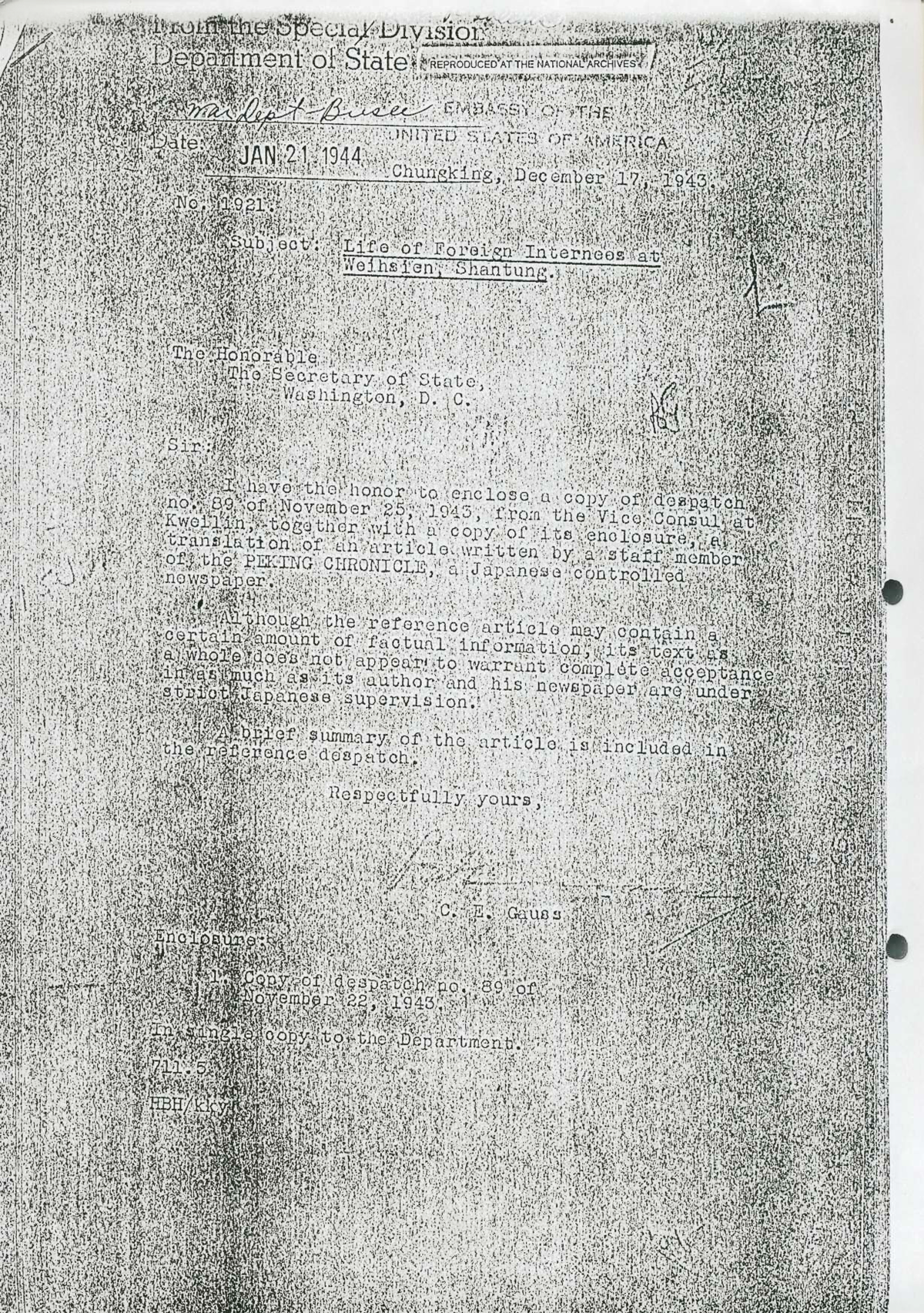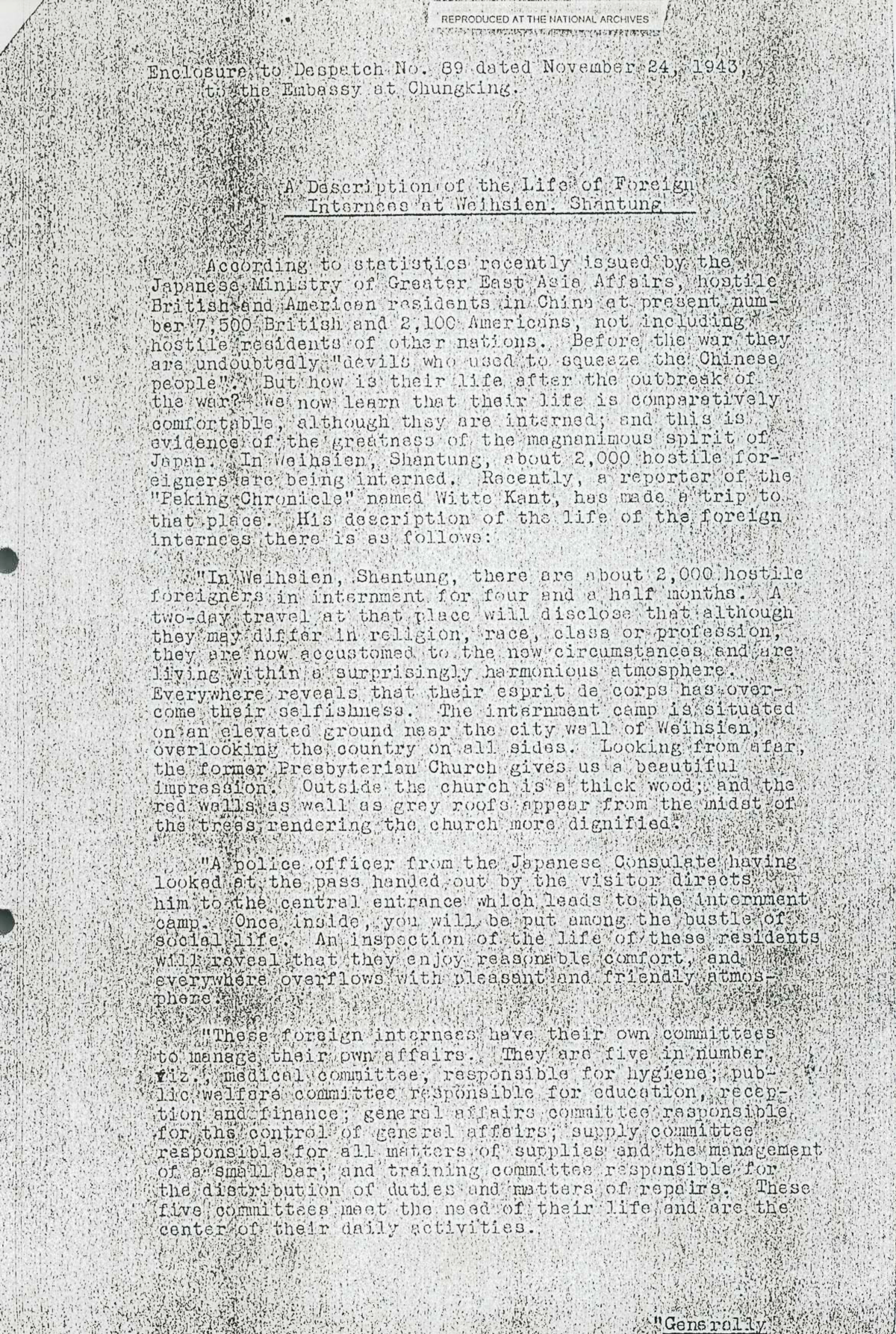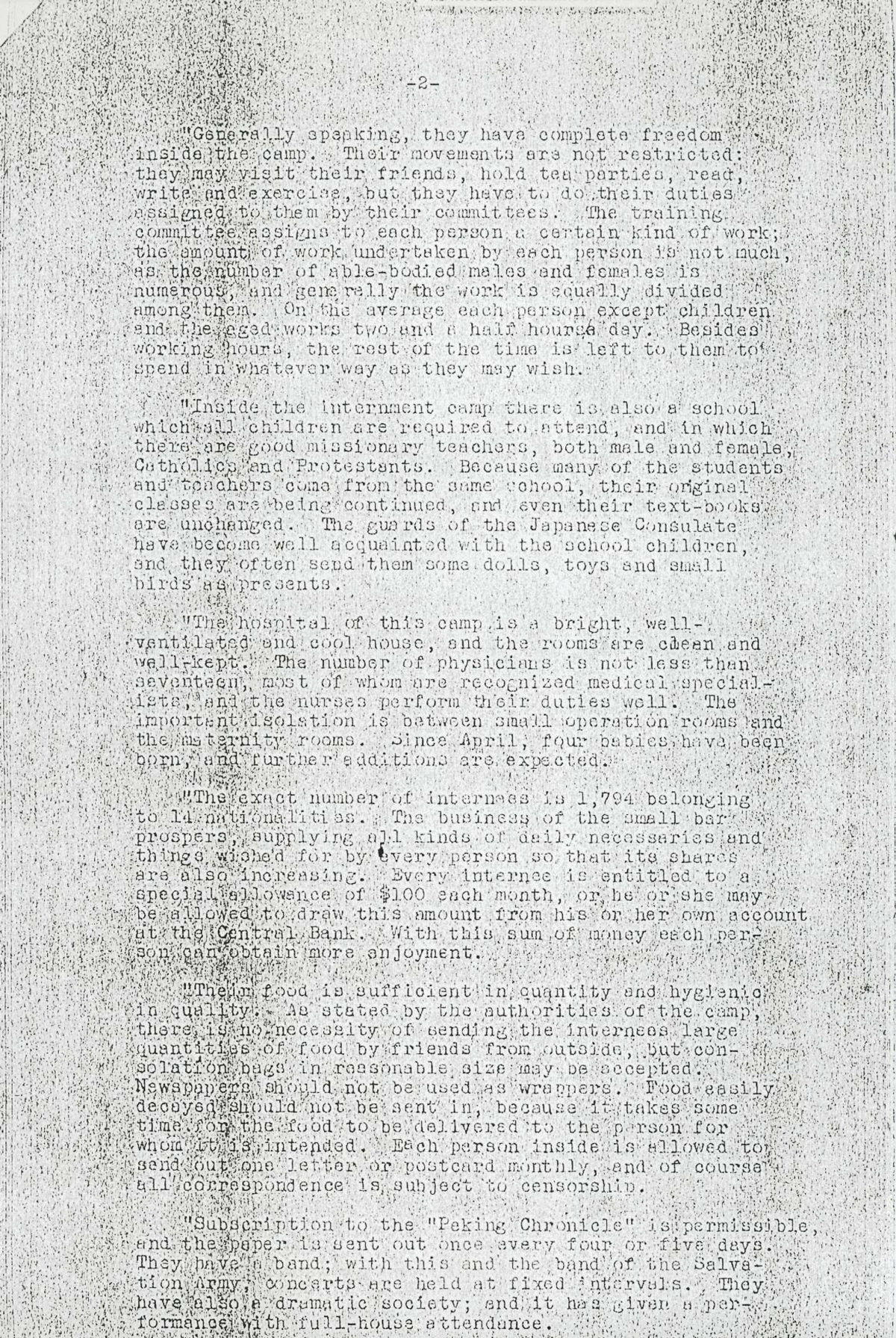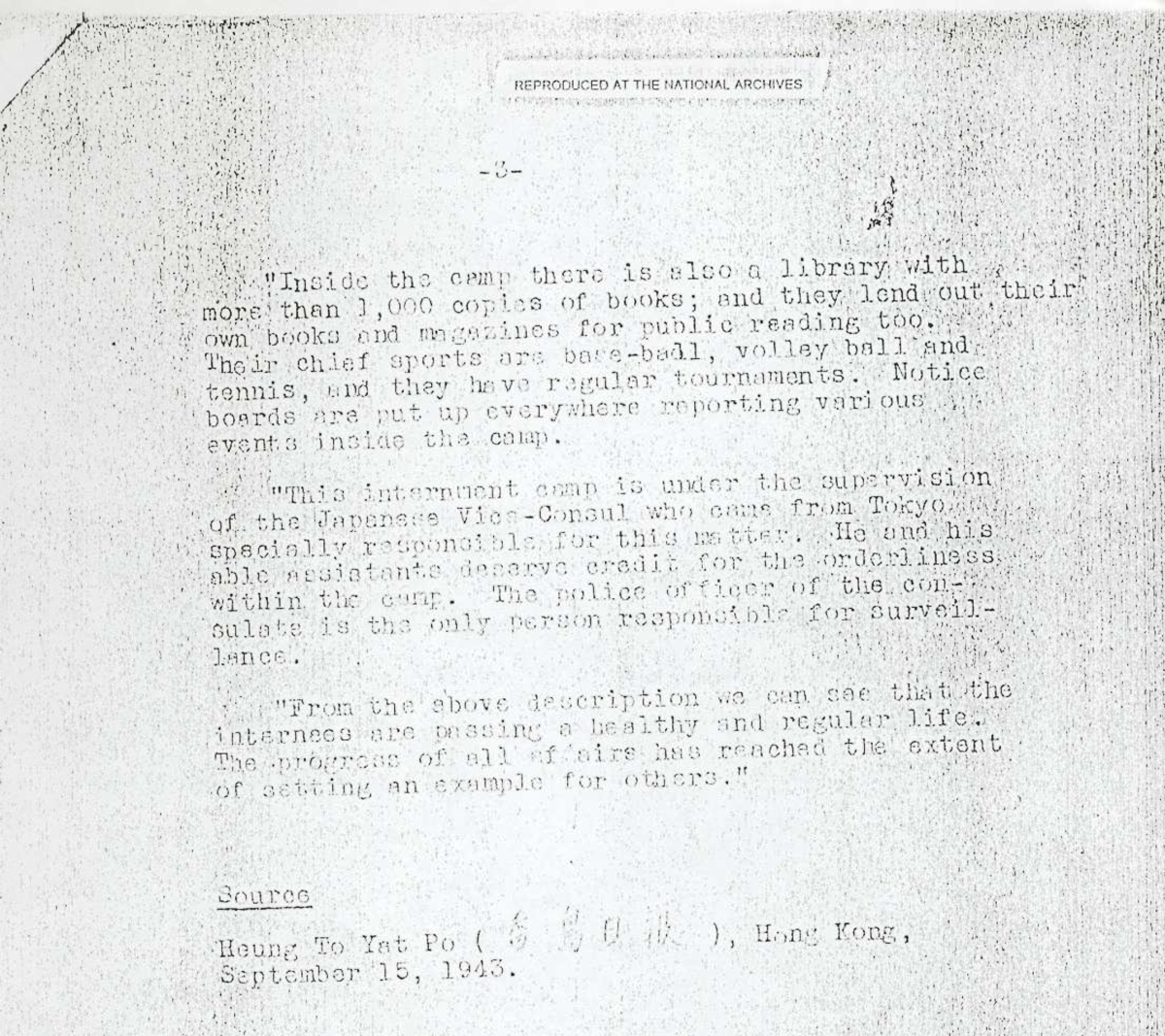
REPRODUCED AT THE NATIONAL ARCHIVES
From The Special Division
Department of State
Embassy of the United States of America
DATE: January 21, 1944
Chungking, December 17, 1943
No. 1921
SUBJECT:
Life of Foreign Internees at Weihsien, Shantung
The Honorable
The Secretary of State
Washington D.C.
Sir,
I have the honor to enclose a copy of dispatch no. 89 of November 25, 1943 from the Vice Consul at Kweilin, together with a copy of its enclosure, a translation of an article written by a staff member of the Peking Chronicle, a Japanese controlled newspaper.
Although the reference article may contain a certain amount of factual information, its text as a whole does not appear to warrant complete acceptance in as much as its author and his newspaper are under strict Japanese supervision.
A brief summary of the article is included in the reference dispatch.
Respectfully yours,
(signed)
C.E. Gauss.
Enclosure:
Copy of dispatch no. 89 of November 22, 1943
In single copy to the department
711.5
HBH/kky
Enclosure to dispatch no. 89 dated November 24, 1943 to the Embassy at Chungking.
A Description of the Life of Foreign Internees at Weihsien, Shantung.
According to statistics recently issued by the Japanese Ministry of Greater East Asia Affairs, hostile British and American residents in China at present number 7,500 British and 2,100 Americans, not including hostile residents of other nations. Before the war they are undoubtedly “devils who used to squeeze the Chinese people”. But how is their life after the outbreak of the war? We now learn that their life is comparatively comfortable, although they are interned; and this is evidence of the greatness of the magnanimous spirit of Japan. In Weihsien, Shantung, about 2,000 hostile foreigners are being interned. Recently, a reporter of the “Peking Chronicle” named Witte Kant has made a trip to that place. His description of the life of the foreign internees there is as follows:
“In Weihsien, Shantung, there are about 2,000 hostile foreigners in internment for four and a half months. A two-day travel at that place will disclose that although they differ in religion, race, class or profession, they are now accustomed to the new circumstances and are living within a surprisingly harmonious atmosphere. Everywhere reveals that their esprit de corps has overcome their selfishness. The internment camp is situated on an elevated ground near the city wall of Weihsien, overlooking the country on all sides. Looking from after, the former Presbyterian Church gives us a beautiful impression. Outside the Church is a thick wood; and the red walls as well as grey roofs appear from the midst of the trees rendering the Church more dignified.
“A police officer from the Japanese Consulate having looked at the pass handed out by the visitor directs him to the central entrance which leads to the internment camp. Once inside, you will be put among the bustle of social life. An inspection of the life of these residents will reveal that they enjoy reasonable comfort, and everywhere overflows with pleasant and friendly atmosphere.
“These foreign internees have their own committees to manage their own affairs. They are five in number, viz. medical committee, responsible for hygiene; public welfare committee responsible for education, reception and finance; general affairs committee responsible for the control of general affairs; supply committee responsible for all matters of supplies and the management of a small bar; and training committee responsible for the distribution of duties and matters of repairs. These five committees meet the need of their life and are the centre of their daily activities.
“Generally speaking, they have complete freedom inside the camp. Their movements are not restricted: they may visit their friends, hold tea parties, read, write and exercise, but they have to do their duties assigned to them by their committees. The training committee assigns to each person a certain kind of work; the amount of work undertaken by each person is not much, as the number of able-bodied males and females is numerous, and generally the work is equally divided among them. On the average each person except children and the aged works two and a half hours a day. Besides working hours, the rest of the time is left to them to spend in whatever way as they may wish.
“Inside the internment camp there is also a school which all children are required to attend, and in which there are good missionary teachers, both male and female, Catholic and Protestants. Because many of the students and teachers come from the same school, their original classes are being continued, and even their text-books are unchanged. The guards on the Japanese Consulate have become well acquainted with the school children and they often send them some dolls, toys and small birds as presents.
The Hospital of this camp is a bright, well-ventilated and cool house, and the rooms are clean and well kept. The number of physicians is not less than seventeen, most of whom are recognized medical specialists, and the nurses perform their duties well. The important isolation is between small operation rooms and the maternity rooms. Since April, four babies have been born and further additions are expected.
“The exact number of internees is 1,794 belonging to all nationalities. The business of the small bar prospers, supplying all kinds of daily necessities and things wished for by every person so that its shares are also increasing. Every internee is entitled to special allowance of $100 each month, or he or she may be allowed to draw this amount from his or her own account at the Central Bank. With this sum of money each person can obtain more enjoyment.
“Their food is sufficient in quantity and hygienic in quality. As stated by the authorities of the camp, there is no necessity of sending the internees large quantities of food by friends from outside, but consolation bags in reasonable size may be accepted. Newspapers should not be used as wrappers. Food easily decayed should not be sent in, because it takes some time for the food to be delivered to the person for whom it is intended. Each person inside is allowed to send out one letter or postcard monthly, and of course all correspondence is subject to censorship.
“Subscription to the “Peking Chronicle” is permissible, and the paper is sent out once every four or five days.
They have a band; with this and the band of the Salvation Army, concerts are held at fixed intervals. They have also a dramatic society; and it has given a performance with full-house attendance.
“Inside the camp there is also a library with more than 1,000 copies of books and magazines for public reading too.
Their chief sports are base-ball, volley-ball and tennis, and they have regular tournaments. Notice boards are put up everywhere reporting various events inside the camp.
“This internment camp is under the supervision of the Japanese Vice-Consul who came from Tokyo, especially responsible for this matter. He and his able assistants deserve credit for the orderliness within the camp. The police officer of the consulate is the only person responsible for surveillance;
“From the above description we can see that the internees are passing a healthy and regular life. The progress of all affairs has reached the extent of setting an example for others.”
#
Source:
Heung Top Yat Po, Hong-Kong,
September 15, 1943.
***
[click here] ... for more ! 
REPRODUCED AT THE NATIONAL ARCHIVES









